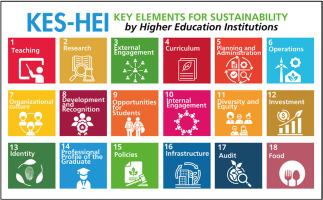Integrating Sustainability into Quality Assessment for Higher Education Institutions
IF 10
1区 环境科学与生态学
Q1 ENGINEERING, ENVIRONMENTAL
引用次数: 0
Abstract
There is a significant discrepancy between initiatives aimed at sustainable development and practical advances that meet environmental and social demands. It is essential to prioritize actions that promote concrete changes in human behavior, with the university environment being a space especially conducive to such transformations. Based on this finding, the main objective of this research is to identify key elements for sustainability that should be incorporated into the instruments for assessing the quality of Higher Education Institutions (HEIs). Two complementary methods were used to achieve this objective: literature review and document analysis. The main result of the research is the presentation of a list of 18 key elements that should be integrated into the evaluation instruments of HEIs, enabling an evaluation based on indicators capable of measuring the incorporation of sustainability in the teaching, research, outreach, and operational activities of these institutions. As a secondary result, it was found that the approach to sustainability in the higher education evaluation instruments used in Brazil is limited, requiring modifications that allow the evaluation process to promote, in the long term, a more proactive role of HEIs in the training and awareness of students regarding sustainability.

将可持续发展纳入高等教育机构质量评估
在旨在实现可持续发展的倡议与满足环境和社会需求的实际进展之间存在着巨大的差距。重要的是要优先考虑促进人类行为的具体变化的行动,大学环境是一个特别有利于这种转变的空间。根据这一发现,本研究的主要目标是确定可持续性的关键要素,这些要素应纳入评估高等教育机构质量的工具。为了达到这一目的,我们采用了两种互补的方法:文献回顾和文献分析。这项研究的主要成果是提出了一份18个关键要素的清单,这些要素应纳入高等教育机构的评价工具,从而能够根据能够衡量这些机构在教学、研究、外联和业务活动中纳入可持续性的指标进行评价。第二项结果是,发现巴西使用的高等教育评价工具的可持续性方法是有限的,需要进行修改,使评价过程能够长期促进高等教育机构在培训和提高学生对可持续性的认识方面发挥更积极的作用。
本文章由计算机程序翻译,如有差异,请以英文原文为准。
求助全文
约1分钟内获得全文
求助全文
来源期刊

Journal of Cleaner Production
环境科学-工程:环境
CiteScore
20.40
自引率
9.00%
发文量
4720
审稿时长
111 days
期刊介绍:
The Journal of Cleaner Production is an international, transdisciplinary journal that addresses and discusses theoretical and practical Cleaner Production, Environmental, and Sustainability issues. It aims to help societies become more sustainable by focusing on the concept of 'Cleaner Production', which aims at preventing waste production and increasing efficiencies in energy, water, resources, and human capital use. The journal serves as a platform for corporations, governments, education institutions, regions, and societies to engage in discussions and research related to Cleaner Production, environmental, and sustainability practices.
 求助内容:
求助内容: 应助结果提醒方式:
应助结果提醒方式:


